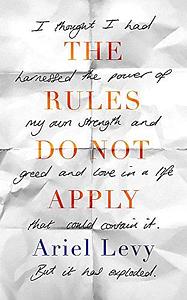You need to sign in or sign up before continuing.
Take a photo of a barcode or cover
Beautifully written, and with some lovely discursive excursions into Levy's career and family background – but the central pull of this memoir is her traumatic experience while on assignment in Mongolia at 8 months pregnant. The moment of the birth, and its aftermath, are written with visceral power and wrenching devastation.
Overall, though, the book felt a bit thin. I'd instead recommend reading the New Yorker article it is based on, Thanksgiving in Mongolia, which has all the emotional heft of the book but with a crisper sense of narrative economy.
Overall, though, the book felt a bit thin. I'd instead recommend reading the New Yorker article it is based on, Thanksgiving in Mongolia, which has all the emotional heft of the book but with a crisper sense of narrative economy.
Ok let me try to condense what I felt about this book. First of all, like most anyone would agree, Ariel Levy is an incredible writer. She knows how to string masterful sentences together. She tells the story of a horrible miscarriage and the beginning, middle, and end of her marriage to her ex-wife. Strangely, Levy refers to herself as a “fake wife” and her “fake marriage” which I’m not sure why but seems disrespectful and perhaps due to some internalized homophobia? She’s now married to a man so maybe my lesbian self is just annoyed at the referral to her wife as a ‘fake wife’.
I respect and value the honesty Levy told her story with. It’s admirable and bold to write your deepest thoughts about your infidelity, grief, and the dissolution of your marriage. She cheated on her wife a lot, and likens her cheating to her wife’s alcohol addiction, which I didn’t care for nor do I agree with. I know it’s not her wife’s story but wow she must have been so incredibly hurt by this. The wife was an addict, and so lied about a lot of things, and Levy writes her brutally honest opinions and responses to what she grew to think of her wife and their relationship.
That’s all fine—we love honesty. I think what I didn’t love is that she didn’t really express any kind of growth after she expressed these judgmental opinions. Hopefully she did, but just didn’t document them. So she comes off as judgmental, entitled, smug and seemingly only able to think from her perspective. The only growth she seemed to showcase was that she now realizes that life isn’t fair and we all die and things suck sometimes. Which, yeah, that can be a hard thing to learn, and she learned it a hard way.
While a part of me appreciated the brevity of the memoir, another part of me feels that it cost the book depth and engagement. The tone throughout is unemotional, even while describing the great emotion that its events brought her. Stylistically, I wondered about how she chose to interject side stories, and much of her account of her career felt a bit misplaced.
This memoir has me thinking: What is the point of a memoir? Is it to tell a story over many years? If so, then it’s got to have throughlines of values or lessons or something else to make it more than just a life story. Even if the life story is crazy or wild or desperately sad.
I respect and value the honesty Levy told her story with. It’s admirable and bold to write your deepest thoughts about your infidelity, grief, and the dissolution of your marriage. She cheated on her wife a lot, and likens her cheating to her wife’s alcohol addiction, which I didn’t care for nor do I agree with. I know it’s not her wife’s story but wow she must have been so incredibly hurt by this. The wife was an addict, and so lied about a lot of things, and Levy writes her brutally honest opinions and responses to what she grew to think of her wife and their relationship.
That’s all fine—we love honesty. I think what I didn’t love is that she didn’t really express any kind of growth after she expressed these judgmental opinions. Hopefully she did, but just didn’t document them. So she comes off as judgmental, entitled, smug and seemingly only able to think from her perspective. The only growth she seemed to showcase was that she now realizes that life isn’t fair and we all die and things suck sometimes. Which, yeah, that can be a hard thing to learn, and she learned it a hard way.
While a part of me appreciated the brevity of the memoir, another part of me feels that it cost the book depth and engagement. The tone throughout is unemotional, even while describing the great emotion that its events brought her. Stylistically, I wondered about how she chose to interject side stories, and much of her account of her career felt a bit misplaced.
This memoir has me thinking: What is the point of a memoir? Is it to tell a story over many years? If so, then it’s got to have throughlines of values or lessons or something else to make it more than just a life story. Even if the life story is crazy or wild or desperately sad.
An poignantly honest and well-written memoir about grief, resilience and courage.
A beautifully written memoir that has emotional pull and the ability to be critically reflective.
Really enjoyed the author's writing style and flow, but never fully felt satisfied with her story - it's sad, depressing and a tad exhausting. Mostly I felt really bad for Ariel Levy. Not how I wanted to feel after reading this.
challenging
dark
emotional
reflective
sad
medium-paced
Ariel Levy’s writing style is effortless and vulnerable. She writes beautifully about human flaws, including her own. She does what good writers are supposed to do - show, don’t tell - but in that showing she can sometimes come across as mean or tone deaf; in reality, I think she is a skilled observer and pulls no punches when it comes to the vagaries of being a woman.
3.5 stars rounded down
"If you saw a push-up bra, you knew you were seconds away from hearing the word empowerment."
"If you believe divorce is an option, you'll take it."
"You have an affair because you are not getting what you want from your loved one. You want more - more love, more sex, more attention, more fun. You want someone to look at you with lust after years of laundry, transforming you into something radiant. You want it, you need it, you owe it to yourself to get it. To live any other way is to be muffled and grey and marching meaninglessly toward death. You want what she gave you at the start, but what you had hoped would expand and intensify instead of shrinking until you find yourself so sad, so resentful, you can barely stand to be you. You have an affair to get for yourself what you wish would come from the person you love the most and then you have broken her heart, and she can never give you any of it ever again."
"If you saw a push-up bra, you knew you were seconds away from hearing the word empowerment."
"If you believe divorce is an option, you'll take it."
"You have an affair because you are not getting what you want from your loved one. You want more - more love, more sex, more attention, more fun. You want someone to look at you with lust after years of laundry, transforming you into something radiant. You want it, you need it, you owe it to yourself to get it. To live any other way is to be muffled and grey and marching meaninglessly toward death. You want what she gave you at the start, but what you had hoped would expand and intensify instead of shrinking until you find yourself so sad, so resentful, you can barely stand to be you. You have an affair to get for yourself what you wish would come from the person you love the most and then you have broken her heart, and she can never give you any of it ever again."
it was going good until she met lucy and it was downhill from there
adventurous
emotional
hopeful
inspiring
reflective
sad
fast-paced
I really enjoyed her writing style as it was easy to follow, even with the "flash backs" thrown in. Heartbreaking stories though.




